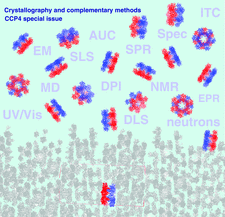issue contents
May 1999 issue

Cover illustration: Electron density for one of the native N-linked carbohydrates found on the haemagglutinin-esterase-fusion glycoprotein from influenza C virus with model for the core trisaccharide (p. 945).
research papers
The crystal structure of the trimeric glycoprotein of influenza C virus has been solved by designing a mercury-containing enzyme inhibitor and receptor analogue and extending SIR phases from 7.0 to 3.5 Å resolution.
PDB reference: haemagglutinin-esterase-fusion protein, 1flc
The strain introduced by mutation of conserved glycine residues produces significant structural changes, allowing rationalization of previously reported reduction potentials and NMR data.
Comparison of the two closely related glucose oxidases and molecular-modelling studies provide explanations for the high substrate specificity and for the lack of product inhibition of glucose oxidase.
A neutron-diffraction study of lysozyme to a resolution limit of 1.7 Å has located 244 water molecules forming an extended constantly fluctuating network covering the protein surface.
PDB reference: triclinic hen egg-white lysozyme, 1lzn
A method to pulverize macromolecular crystals for seed stock using a microcentrifuge tube and PTFE bead as mortar and pestle is presented. Energy to crush the crystal is supplied by ultrasound or vortex mixing.
The unexpected observation of a systematic variation in χ1 mean values with resolution is attributed to the presence of multiple rotameric states, the averaged conformation derived from averaged electron density at low resolution being resolved into its individual components as resolution improves.
Comprehensive measurements of tetragonal lysozyme (101) face growth rates show an unusual supersaturation dependence, which had been observed previously on the (110) face.
The smallest growth unit of the (101) face of tetragonal lysozyme crystals was found to be a tetramer from molecular-packing considerations and modeling of measured growth rates.
High-resolution atomic force microscopy investigation shows that the molecular packing on the (110) face of tetragonal lysozyme crystals corresponds to 43 helices.
A time-resolved atomic force microscopy investigation shows that the growth units of the (110) face of tetragonal lysozyme crystals are at least of tetramer size and correspond to the 43 helices.
crystallization papers
Crystals of E. coli cysteinyl-tRNA synthetase bound to ATP and cysteine have been obtained. A complete native data set to 2.7 Å resolution has been collected.
A method for purifying and crystallizing in KCl/phosphate the intact histone octamer of the nucleosome with a high yield is described. The crystals diffract to 2.15 Å resolution in the P65 space group and X-ray diffraction data have been refined.
A slow processing precursor of penicillin acylase has been crystallized.
The crystallization of chondroitinase B, a glycosaminoglycan lyase from F. heparium, is reported. Crystals form in space group P21, and a native data set has been collected to 2.2 Å using a rotating-anode source.
Crystals have been grown of the catalytic core domain of a T. reesei β-mannanase belonging to glycoside hydrolase family 5. Data have been collected for the native enzyme to 2.0 Å resolution at room temperature and for a platinum derivative to 1.65 Å resolution at 110 K.
Deoxycytidylate hydroxymethylase from bacteriophage T4 has been crystallized in the presence of its substrate using sodium citrate as precipitant. Native data have been collected to 1.6 Å resolution.
The neurotoxic, heterodimeric phospholipase A2 from the Taiwan viper (V. russeli formosensis) has been crystallized and its crystal structure has been determined by molecular-replacement methods.
Three different forms of human erythrocyte catalase have been obtained by hanging-drop vapour diffusion.
A fragment of chicken tenascin consisting of fibronectin type-III domains 5 and 6 has been expressed in E. coli and purified to electrophoretic homogeneity. Single crystals were obtained which are suitable for X-ray structure analysis.
Two thiol proteases, ervatamin B and C, isolated from the medicinal plant E. coronaria, have been crystallized. The crystals have been characterized and data sets have been collected. Structure solution by molecular replacement and refinement are in progress.
A rolling-circle plasmid replication initiator protein has been crystallized successfully for the first time and X-ray data to 3.5 Å have been collected on a synchrotron radiation source.
Bovine cyclophilin 40, a two domain immunophilin has been crystallized in two different crystal forms. This provides the first example of the crystallization of a larger protein containing a cyclophilin domain.
The 51 kDa protein of the mosquito-larvicidal binary toxin from B. sphaericus has been crystallized and preliminary X-ray diffraction data have been obtained.
Overexpression, purification and crystallization of recombinant chloramphenicol 3-O-phosphotransferase, a novel chloramphenicol-inactivating kinase, from S. venezuelae.
A highly diffracting crystal of FMN-binding protein has been obtained.
The complex between ecotin and chymotrypsin has been crystallized. The triclinic crystals diffract beyond 2.0 Å and are very stable in the X-ray beam.
β1-Bungarotoxin is a heterodimeric neurotoxin consisting of a phospholipase A2 subunit linked by a disulfide bond to a K+ channel binding subunit which is a member of Kunitz protease inhibitor subfamily. It was crystallized in space group C2221 with unit-cell dimensions a = 80.7, b = 82.5, c = 56.9 Å with a solvent content of 48%.
A bleomycin-binding protein encoded on the transposon Tn5 was crystallized in a form suitable for X-ray diffraction analysis. The diffraction data were collected to 2.0 Å resolution with a merging R value of 0.052, corresponding to a completeness of 91%.
The phosphopantetheinyl transferase Sfp from Bacillus subtilis was overproduced in Escherichia coli, purified and crystallized, both in its native form and as a selenomethionyl derivative. Well diffracting single crystals were obtained.
Unmodified, active human TRAIL (Apo-2L) has been crystallized. Initial results indicate that the cytokine is a homotrimer.
short communications
A new crystal form of the ATPase domain of human Hsp70 is described. The structure reveals that the IIB subdomain of Hsp70 is flexible, which may facilitate cofactor binding and protein–protein interactions.
PDB reference: Hsp70 ATPase domain, 1hjo
addenda and errata
Free 

Free 

A correction to the paper by McMahon, Leonard, Buchanan, Giraud & Naismith [Acta Cryst. (1999). D55, 399–402].
Free 

A correction to the paper by Cruickshank [Acta Cryst. (1999). D55, 583–601].


 journal menu
journal menu





















































